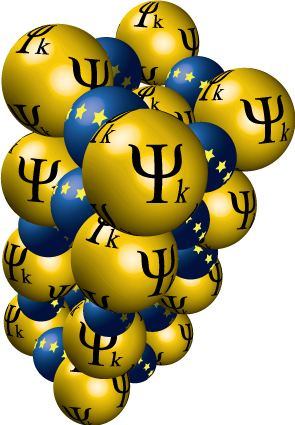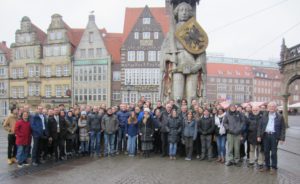 |
 |
2020-21 CECAM-Psi-k Research Conference |
|
| CECAM and Psi-k launch every year a call to organize a high-profile common research conference on an outstanding subject in the broad area of computational molecular and materials science; topics can range from applications in solid-state materials, soft matter, or biomolecules, to theoretical, methodological, and algorithmic advances. We particularly encourage proposals that promote interdisciplinary exchange across the areas indicated above and focus on exceptional scientific challenges that go beyond current boundaries and foster the discussion of new developments.
The conference should typically last between 3.5 and 5 days, and target a max of 100 participants, with a structure and format dedicated to foster plentiful discussions and informal interactions among the participants, proactively engaged by conference organizers and discussion leaders. Proposals must be submitted online at https://www.cecam.org/submit-psi-k/. All conference proposals will be peer reviewed, discussed, and ranked by a scientific panel composed by 3 members proposed by CECAM, and by 3 trustees of Psi-k. In the proposal, emphasis should be placed on outlining the challenging scientific issues, which will be the focus of the event, and in establishing the proposed list of speakers and participants. Active participation of scientists at different stages of their career, and especially early states, is very encouraged, as is diversity in the speakers and leaders. The proposal should include information on the venue (anywhere in the EU, UK, and associated countries – Iceland, Norway, Albania, Bosnia and Herzegovina, North Macedonia, Montenegro, Serbia, Turkey, Israel, Moldova, Switzerland, Faroe Islands, Ukraine, Tunisia, Georgia, Armenia), and a tentative budget. Organizers can be based at institutions worldwide. CECAM and Psi-k are committed to support the event with up to 30,000 euro. Conference fees may be charged only to cover costs. The call will be open until June 15th 2019 and the final outcome will be communicated at the end of July 2019. Proposals that are not selected will be considered also for regular CECAM and Psi-k activities, if the organizers activate this option in the submission. The conference must take place between Apr 2020 and Mar 2021, avoiding for this year overlaps with Psi-k 2020, that will be held in September 2020. For further information, please do not hesitate to contact us. |
|
| Ignacio Pagonabarraga CECAM Director [email protected] |
Nicola Marzari Psi-k Chairman [email protected] |
Monthly Archives: April 2019
5th TYC Energy Workshop: From Atoms to Applications
The Thomas Young Centre (TYC) held their 5th Energy workshop, entitled “From Atoms to Applications” from the 25th to the 27th of July 2018 at the Department of Chemistry in University College London. The meeting was focussed on the evolution of computational materials design, specifically for Energy Materials. The aim of the workshop was to showcase the latest advances in computational materials design and to promote discussion and debate on bridging theory and experiment. We had a range of excellent speakers on the side of theory and of experiment, and it was clear from the discussions after talks and at the coffee breaks and lunches that the combination of theory and experiment is alive and thriving. The programme featured invited talks from established leaders in the field and from emerging early career researchers in the area. We scheduled 15 minutes for questions after every presentation, and this prompted lively discussion and debate. We had 99 attendees ranging from established academics, to PDRAs, PhD students and even Undergraduate students, with representation by Senior Editors from Nature and Nature Materials. The workshop featured diverse energy applications such as oxide and proton conducting fuel cells, photocatalysis, photovoltaics, LEDs, catalysis, solid state batteries, organic electronics and amorphous oxides semiconductors.
Read the full report here.
Interface Properties in Organic & Hybrid Electronics (IPOE-2019)
IPOE-2019
2d International Conference on
Interface Properties in Organic and Hybrid Electronic:
Perspectives & Key Challenges
Cergy-Pontoise, France, 8-11 July 2019
https://ipoe2019.sciencesconf.org
IPOE-2019 will be entirely devoted to the physical phenomena occurring at organic/organic, organic/inorganic and organic/metallic interfaces.
IPOE-2019 is a single-session conference, comprising a plenary lecture by Prof. Rudolph A. Marcus, Nobel Prize in Chemistry, 12 keynote- and invited lectures, 36 oral contributions, and a poster session. The conferences will be followed by ample time devoted to questions (20 min / 10 min / 5 min for KN / Invited / Oral Contributions respectively), in addition to discussions during a poster session.
The conference will cover a broad range of areas related to both experimental and theoretical aspects of these processes, comprising the following topics (but not limited to):
- Charge separation mechanisms
- Charge generation mechanisms
- Energy transfer processes
- Energy landscape at interfaces
- Materials for interface engineering
- Interfacial versus bulk properties
- Hybrid organic/inorganic interfaces
- Metal/organic interfaces
- Organic/organic interfaces
- Solar energy conversion
- Organic sensors and bioelectronics
- Molecular spintronics
- Organic and Hybrid SCs, O&H LEDs, OFETs
- Experimental probes
- Molecular modeling and theoretical models
Report: CECAM / PSI-K Workshop Bremen on Correlated electron physics beyond the Hubbard model
Organizers: Tim O. Wehling (Bremen), Thomas Frauenheim (Bremen), Silke Biermann (Palaiseau Cedex), Johannes Lischner (London), Nikolay Prokofiev (Amherst, Massachusetts), Malte Schüler (Bremen), Andrew Millis (New York)
Venue: University of Bremen, Bremen Center for Computational Materials Science (BCCMS), Germany, 8th until 12th of October 2018
Sponsors: University of Bremen (BCCMS), Psi-k, DFG, CECAM
Electrons in real materials are subject to Coulomb interaction among each other. This interaction is long-ranged, gives rise to correlation effects, and often poses fundamental problems in ab initio simulations of real materials. A nowadays commonly used ab initio approach for strongly correlated materials is the augmentation of density functional (DFT) based methods with many-body treatments of the Hubbard model, such as the combination of DFT and dynamical mean field theory [1]. This approach, however, neglects all correlation effects stemming from non-local Coulomb interaction, since the Hubbard model only includes the on-site part of the interaction. Combining more sophisticated diagrammatic ab initio methods (GW) with methods and models which contain the long-range contributions of the interaction (EDMFT) [2] alleviates these problems in part but comes with the introduction of further approximations. Assessing the quality of such approaches is currently hampered by the fact that even the extended Hubbard model, which is the minimal many-body model capturing explicitly non-local interactions, is at best partially understood. Continue reading Report: CECAM / PSI-K Workshop Bremen on Correlated electron physics beyond the Hubbard model

